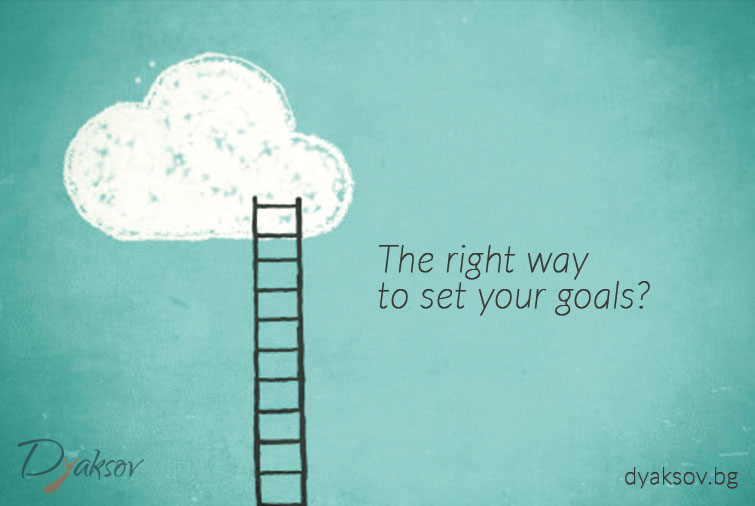What is the right way to set your goals?
Did you already set your goals for the new year? No? Then this article might be of help.
Before I share with you my tactics for achieving my goals (with their help I’ve accomplished most of the goals I have set for myself), let’s just ask ourselves what exactly is a goal and why goal setting is so important.
What exactly is a goal and why goal setting is important?
As a concept, the goal has many definitions. One of my favorite that I think describes it best and most correctly is “an objective that a person or a system plans or intends to achieve with certain actions“. Okay, now it is clear. It’s important, however, not to be mistaken with a task, dream, desire or intention. Steve Smith has said “The difference between a goal and a dream is a deadline”. A goal is a dream with a plan of action, the action itself and a deadline. We will never be able to turn our dreams into reality with only daydreaming and no action.
But why is it so important to set goals? Briefly – because that is one of the ways we grow.
Brian Tracy, a world-famous motivational speaker, says that it’s not important who you are or where you come from. What matters is where you are going.
Without goals, we have no direction. Without goals, we are ships without a compass and a destination that will be eventually lost in the sea. Without goals, we will never be able to bring out our best version of ourselves and will be lost in a sea of mediocrity.
It is scientifically proven that with no goals set, our brain misses important opportunities. We are living in a time that gives us access to too much information. So it’s perfectly natural for our brain to shut down once in a while, just sort through it all and allow for just what it thinks it’s important to pass through. And while that is good and healthy, our brain also makes mistakes sometimes. When we haven’t formed it into an idea, goal, desire or even though, it won’t know that it is of interest to us.
These are the reasons why goal setting is such an important part of my personal and professional development.
If you too believe that setting goals is an important part of our development and growth, here are my pieces of advice on the successful accomplishment of goals:
-
Be (purpose)ful
Always set well-defined and proper goals! A goal is supposed to be clear and in order for that to happen, you must first answer to these questions. Ask yourself “Why?” – why do you want this, exactly this; “Am I doing this for me or anyone else?”; “What should I do?” – what actions should I take to turn this into a real thing, what are you willing to give to accept the change.
For example, your goal is to increase your income. But saying “I want to be rich” won’t lead to any change in your life. You must ask yourself these questions, see your goal, envision it, feel its realness right at this very moment. After that ask yourself what exactly it means for you to be rich. How much money should you make in order to think of yourself as a rich person? Or richness for you is defined not by money but by something else and you have a totally different goal ahead of you? Then put it into context – “I want to make 3000 EURO per month”, “I want to be surrounded by only good and ambitious people” (for you, having great wealth might mean having good people around you)…Which leads us to:
-
Divide it into micro goals (or objectives)
The saying “Every journey begins with a single step” is as cliché as it is true. When we are faced with a big goal, that will take a lot of time, it seems distant and sometimes even threatening and therefore we are having a hard time finding desire and motivation to start doing something towards it. That is the reason why we must divide it into small objectives that we can get on with at the very same moment – this makes it more real and measurable. This relates directly to task micromanagement. Even if we just take the psychological explanation – when we divide a big and important goal into many small ones, we now have many micro tasks to tackle. It is proven that putting a “tick” symbol next to a completed task brings us immense satisfaction and makes us feel better and more motivated. Therefore, by conquering one micro goal after another we will not only be closer to the finish line and accomplishing the big goal, but we will be more pleased and satisfied.
We will continue using the same example: you are not surrounded by as many good and ambitious people as you wish. You now have a clearer goal, but you still don’t have any of the details. What to do then? Divide it into different parts and answer all questions they raise. In order to attract ambitious and good people in your life, you yourself must be one of them. Start by working on yourself and your personal development, widen your horizons and interests, visit places that you know people you’d like to communicate go to and so on… That is only some examples of the objectives you can set before yourself in order to accomplish the big one, the big goal.
-
Determine a deadline
Remember what Steve Smith has said. Setting a deadline for our goal is mandatory – that is if we actually what to achieve our goal. With a deadline, it becomes more real and measurable. A deadline must fit into two criteria – it must be realistic and exact. Setting a realistic deadline is taking the right amount of time to achieve a certain goal, to be physically possible. You can’t decide you want to be a millionaire in 2 years time considering you now make the minimum working wage. If that actually is an end game for you – set a realistic and an exact deadline including a detailed plan for execution (with micro goals and microtasks). Then and only then it will have value and the possibility of it turning into a reality will rise immensely.
-
Setting a realistic goal
As a contrast to the realistic deadline, a realistic goal is related to the actual possibility of the achieving of a certain goal.
For example, I may wish to become a president of the USA (I actually don’t). And though at this moment the saying “anyone can become a president” is taken quite too literally, for some people is actually impossible. Without an American citizenship, it’s not possible to become a presidential candidate. (Well, if we have to be honest, even if I did have one of those, this still wouldn’t qualify as a realistic goal.)
It’s not bad to set big goals for yourself (it’s even recommended), but limit your goals to possible and realistic one. Because the disappointment from failing to achieve a certain goal can leave hard prints on your motivation, desire and perseverance. And that is just a result of an incorrectly set goal.
-
Share your goals
When you share your goals with our close ones, it automatically becomes more real. Our motivation and productivity grow too – with an impossibility to achieve and deliver, and failing will actually disappoint two people, instead of one. This thought acts as a motivation booster – who would want to fail not only himself but their close ones with just one action (or the lack of it).
Also, if we actually speak of it and say it out loud, it stays longer and becomes more real and feasible.
-
Write your goal on a piece of paper
Another way for your goal to become more feasible and real is to write it on a piece of paper. When we actually write, with our own handwriting, it instantly becomes more real and more close to us.
Writing it on a piece of paper makes us accept it even more seriously. Also, many people have a more developed visual memory, so this also makes it more measurable and feasible. It is also proven that writing your goal as you have already accomplished it, helps with our motivation and increases the belief in ourselves.
-
Focus on results
When you focus on the end game, on results, on the happiness your now accomplished goal will bring you, it will become easier to actually do it. Of course, this doesn’t mean that you should ignore all your current micro tasks and objectives. This only works because using the results and the satisfaction they will bring and all the good things you will gain, just acts as an additional motivation booster.
-
Be adaptive
After all, it’s not all up to us. Of course, this doesn’t mean that it’s okay to blame the circumstances, Mercury Retrograde or the people around you for your mishaps. But when it comes to your goal, it’s all up to you. It’s important to focus on our actions, to control everything we can control, and not give up when the circumstances are bad. As important it is to be intent, motivated and to track our progress, it is equally important to go with the flow and adapt to our surroundings and our internal voice. You are responsible for your success or your failure.
However, if at some moment, the circumstances, your needs or desire take a totally different course, you must be okay with giving up a goal, in order to pursue another one, that will actually take you closer to the wanted result. It’s important to remember that success is not a one-way street. The road to your personal success might have many different roads
-
Faith, perseverance, persistence and desire
It all comes down to this. If you don’t believe in your goal and yourself, you won’t achieve it. If you don’t have any desire and motivation to do or work hard, you won’t achieve it. If you are not persistent and perseverance, you blame other people’s actions or the circumstances for your failures, you won’t achieve anything. Do you know what’s the difference between the successful people and the ones that fail in life – the perseverance of the first ones.
But even if do fail at something, this won’t leave such a permanent mark on your life – just carry on, set more goals and move forward. Don’t give up. Never give up.
Have S.M.A.R.T. goals
Specific – answering to the questions such as who, what, where, when, why, which. Define it as much as possible with no ambiguity.
Measurable – From … To – Track your progress, measure the outcome.
Attainable – How – Is the goal reasonable enough to be accomplished?
Relevant – Is it worth it? – Is the goal worthwhile and will it meet your needs?
Timely – When? – Your goal should include a reasonable time limit.
5 years ago I made a thorough plan for the next 5 years of my life. Using all I’ve learned, combining it with perseverance and persistence – well, I can honestly say that my vision for my life in 5 years became a reality – exactly the way I pictured it.
Now you do this experiment. Find some quiet and peaceful space, make yourself comfortable, relax and close your eyes. Don’t take into an account stereotypes or other people’s opinions – this is your fantasy and it’s time you created the future exactly the way you want it.
The year is 2023. Where are you? What are you doing at this exact moment? How do you look like? Are you alone or there are people around you – if so, who are they? What happened in your life? What do you feel? You smile – why?…
This is your vision for your life in 5 years. What will you do to make it true?
And now I dare you – get a pen and a piece of paper. Write at least 10 goals for a period of time of your choice. Use clear and well-defined words, stick to S.M.A.R.T. goals and the advice I gave you, and don’t be afraid to set big goals for yourself. Happy goal-setting!








